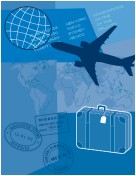CARL WATTS & ASSOCIATES
April 16th, 2012

|
Washington DC
|
tel/fax 202 350-9002 |
|
Whether an employee or a business owner, there are quite a few work-related expenses that you may deduct on Schedule A, itemized deductions, or on Schedule C, income/loss from business.
|
|
Travel, meal and entertainment expenses that are ordinary and necessary in carrying on a trade or business are among the work-related expenses.
|
|
An ordinary expense is one that is common and accepted in your trade or business. A necessary expense is one that is helpful and appropriate for your business. An expense does not have to be required to be considered necessary.
 |
|
If you are an employee, your allowable travel expenses are figured on Form 2106 or Form 2106-EZ. Your allowable unreimbursed expenses are carried from Form 2106 to Form l040 Schedule A, and are subject to a limit based on 2% of adjusted gross income.
|
|
If you are an employee whose deductible business entertainment expenses are fully substantiated and reimbursed under an accountable plan, the reimbursement should not be included in your wages on Form W-2 and you should not deduct the expenses. If your expenses exceed the reimbursement you received under an accountable plan, if you were reimbursed under a non-accountable plan, or if you are not reimbursed at all, you can use Form 2106 to deduct employee business entertainment expenses that otherwise qualify as deductible expenses.
|
|
|
|
If you do not itemize your deductions, you cannot deduct these expenses.
|
|
|
 |
|
What are the accepted travel expenses?
|
|
First of all, you are traveling away from home if your duties require you to be away from the general area of your tax home for a period substantially longer than an ordinary day's work, and you need to get sleep or rest to meet the demands of your work while away. Your tax home is the entire city or general area where your main place of business or work is located, regardless of where you maintain your family home.
|
|
Deductible travel expenses include:
|
|
|
|
|
|
|
|
|
|
Many away-from-home travel expenses are not deductible or are restricted in some way. These include:
|
|
|
Travel & Entertainment
Expenses
Expenses
|
|

|
|
The deduction for business meals is generally limited to 50% of the unreimbursed cost. Just like business meals, only half of entertainment expenses are deductible. There are limits and restrictions on the deductibility of entertainment expenses. For employees who are "fully reimbursed", the limits are imposed on the employer, not the employee. Entertainment must be either directly related to your business or associated with it, and must be substantiated.
|
|
To be directly-related, the main purpose of the entertainment activity must be the conduct of business, meaning business was actually conducted during the activity and you had more than a general expectation of getting income or some other specific business benefit at some future time.
|

Or, the entertainment must be associated with the active conduct of your trade or business and occur directly before or after a substantial business discussion.
|
|
If you are a business traveler who entertains clients, you may be able to deduct some of these expenses. It all depends on the type of entertainment. The IRS notes it does not consider sporting events and social gatherings, such as cocktail parties, as business events. Meals where business is discussed are allowable unless the meal is being deducted as a travel expense.
|
|
While the general rule requiring the 50-percent reduction in the otherwise deductible meal and entertainment expenses relates to “the amount allowable as a deduction under this chapter,” the 50-percent limitation apparently does not apply to all deductions for meals, because the reduction is limited to only meals consumed in connection with your trade or business or in connection with an income-producing activity.
|

Therefore, meals consumed while traveling for medical purposes or while performing charitable services away from home should not be subject to the 50 percent limitation, because medical treatment or charitable contributions are not part of a taxpayer's trade or business.
|
|
Accordingly, the costs of meals consumed in connection with either (provided that the meals are otherwise deductible as medical expenses or charitable contributions) are arguably fully deductible.
|
|
The IRS requires records for any expense a business person wants to deduct on his taxes. To claim travel expenses, you must have records of time, date, place, cost and purpose for each expense. You must also have such records for entertainment expenses, as well as the type of entertainment and a description of what business was discussed during the entertainment event.
As is usually the case, the advise of a professional may be priceless in planning and filing your taxes. |
 |
|
Troubles viewing this message? View in browser online here
|